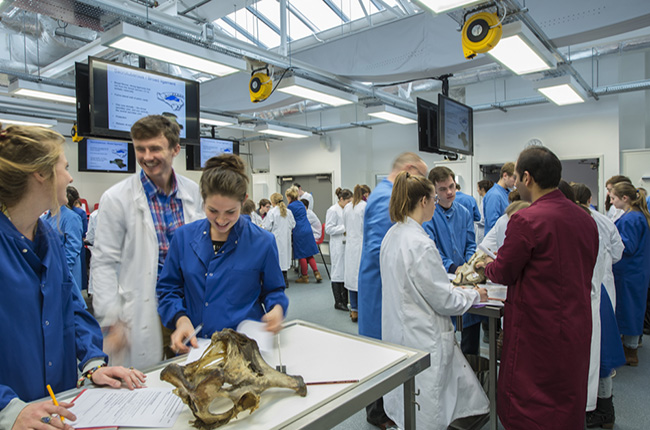
Top Veterinary Schools in the World
Here is a list of some of the top universities globally known for their veterinary courses, based on academic reputation, research output, and the quality of their programs. These institutions are recognized for their comprehensive curricula, state-of-the-art facilities, and contributions to veterinary science.
Top Veterinary Schools in the World
United States
- University of California, Davis (UC Davis)
- Program: School of Veterinary Medicine
- Highlights: Consistently ranked as one of the top veterinary schools in the world. Offers a wide range of specialties and is known for its cutting-edge research and clinical services.
- Cornell University
- Program: College of Veterinary Medicine
- Highlights: Offers a rigorous curriculum with extensive clinical training. Renowned for its research programs and veterinary teaching hospital.
- Colorado State University
- Program: College of Veterinary Medicine and Biomedical Sciences
- Highlights: Known for its research in veterinary oncology, equine medicine, and infectious diseases. Offers diverse clinical training opportunities.
- University of Pennsylvania
- Program: School of Veterinary Medicine (Penn Vet)
- Highlights: Offers a unique blend of urban and rural veterinary education. Known for its strong emphasis on clinical practice and research.
United Kingdom
- University of Cambridge
- Program: Department of Veterinary Medicine
- Highlights: Offers a rigorous and research-focused veterinary program. Known for its strong emphasis on clinical practice and research excellence.
- Royal Veterinary College, University of London
- Program: Various undergraduate and postgraduate veterinary programs
- Highlights: One of the oldest veterinary schools in the world. Renowned for its research, clinical services, and comprehensive veterinary education.
- University of Edinburgh
- Program: Royal (Dick) School of Veterinary Studies
- Highlights: Known for its strong research programs and clinical services. Offers a diverse range of specialties and has state-of-the-art facilities.
Australia
- University of Sydney
- Program: Sydney School of Veterinary Science
- Highlights: Offers a comprehensive veterinary curriculum with strong research programs. Known for its excellent clinical training and facilities.
- University of Melbourne
- Program: Faculty of Veterinary and Agricultural Sciences
- Highlights: Offers a highly regarded veterinary program with a strong emphasis on research and practical training.
Canada
- University of Guelph
- Program: Ontario Veterinary College
- Highlights: Known for its comprehensive curriculum, strong research programs, and excellent clinical training opportunities.
Europe
- Utrecht University (Netherlands)
- Program: Faculty of Veterinary Medicine
- Highlights: Offers a highly regarded veterinary program with a strong emphasis on research and international collaboration.
- Ghent University (Belgium)
- Program: Faculty of Veterinary Medicine
- Highlights: Known for its research output and comprehensive veterinary education.
Asia
- University of Tokyo (Japan)
- Program: Department of Veterinary Medical Sciences
- Highlights: Offers a prestigious veterinary program with a strong emphasis on research and advanced clinical training.
- Korea University (South Korea)
- Program: College of Veterinary Medicine
- Highlights: Known for its research in veterinary science and comprehensive veterinary curriculum.
Conclusion
These universities are recognized for their excellence in veterinary education, research, and clinical training. When choosing a veterinary school, it’s essential to consider factors such as location, specific areas of interest or specialization, research opportunities, and the overall curriculum to find the best fit for your career goals.
Admission to a veterinary course, particularly a Doctor of Veterinary Medicine (DVM) program, is competitive and requires careful preparation. Here are the typical steps and requirements for gaining admission to a veterinary school:
1. Educational Prerequisites
- Undergraduate Degree: Most veterinary schools require applicants to have completed at least three years of undergraduate education, although many prefer or require a completed bachelor’s degree.
- Prerequisite Courses: Specific courses are required, typically including:
- Biology: General biology with lab, genetics, microbiology.
- Chemistry: General chemistry with lab, organic chemistry with lab, biochemistry.
- Physics: General physics with lab.
- Mathematics: College-level math, often including statistics.
- Humanities and Social Sciences: Courses in English, communication, and sometimes social sciences.
2. Experience
- Animal Experience: Hands-on experience working with animals is crucial. This can include volunteering or working at animal shelters, farms, zoos, or wildlife rehabilitation centers.
- Veterinary Experience: Shadowing or working with licensed veterinarians in clinical settings is often required. This helps applicants understand the veterinary profession and gain practical insights.
3. Standardized Tests
- GRE (Graduate Record Examination): Many veterinary schools require the GRE. It assesses verbal reasoning, quantitative reasoning, and analytical writing.
- CASPer Test: Some veterinary schools use the CASPer (Computer-Based Assessment for Sampling Personal Characteristics) test to evaluate non-cognitive skills and interpersonal characteristics.
4. Application Materials
- Transcripts: Official transcripts from all post-secondary institutions attended.
- Personal Statement: An essay detailing your interest in veterinary medicine, relevant experiences, and career goals.
- Letters of Recommendation: Typically, three letters are required, often from professors, veterinarians, or professional mentors.
- Resume/CV: A detailed resume or CV outlining your educational background, work experience, volunteer activities, and any relevant skills or achievements.
5. Application Process
- VMCAS (Veterinary Medical College Application Service): Most veterinary schools in the United States and some international schools use VMCAS for the application process. It centralizes the application submission to multiple schools.
- School-Specific Applications: Some schools may have additional application requirements or supplemental forms to be submitted directly to them.
6. Interviews
- Selection for Interviews: Competitive applicants are invited for interviews. The format can vary, including traditional one-on-one interviews, panel interviews, or Multiple Mini Interviews (MMIs).
- Preparation: Be prepared to discuss your experiences, motivation for pursuing veterinary medicine, understanding of the profession, and ethical scenarios.
7. Additional Requirements
- Background Checks: Some veterinary schools may require background checks before admission.
- Technical Standards: Applicants may need to meet certain physical and technical standards to ensure they can perform the tasks required of a veterinarian.
Tips for a Successful Application
- Academic Excellence: Maintain a strong GPA, particularly in science courses.
- Diverse Experience: Gain a variety of experiences with different animal species and in different veterinary settings.
- Strong Relationships: Build strong relationships with mentors and supervisors who can provide meaningful letters of recommendation.
- Research Schools: Understand the specific requirements and preferences of each veterinary school to tailor your application accordingly.
- Prepare for Interviews: Practice common interview questions and scenarios related to veterinary medicine.
Conclusion
Admission to a veterinary course requires a combination of strong academic performance, relevant experience, and a well-rounded application. By fulfilling the prerequisite courses, gaining hands-on experience, performing well on standardized tests, and presenting a compelling personal statement, you can enhance your chances of being accepted into a veterinary program.



